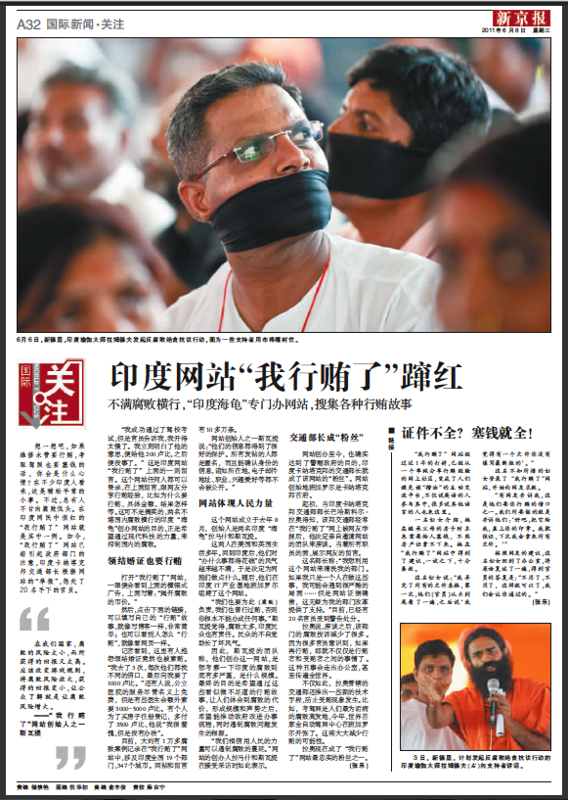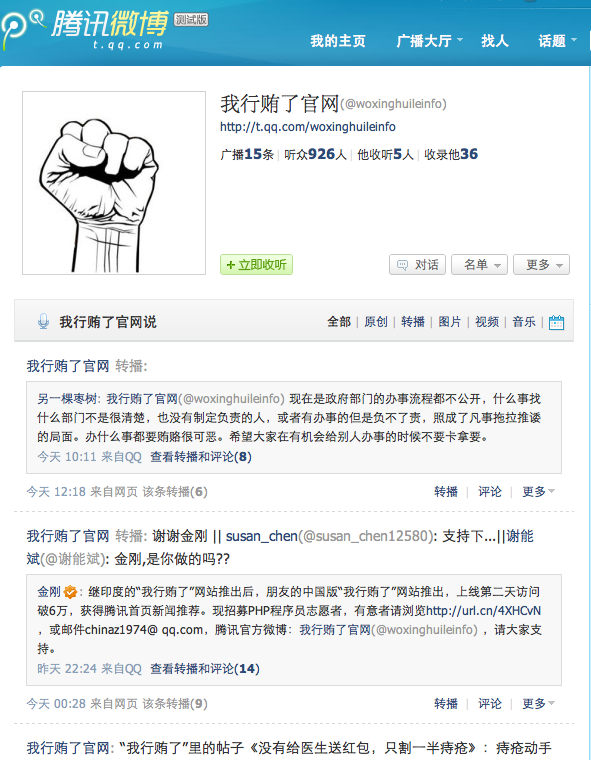Late last week, The Beijing News ran a report on an anti-corruption website launched in India by a Bangalore-based non-profit organization that aims to fight corruption in Indian society. The site, “I Paid a Bribe” (http://ipaidabribe.com/) seeks to improve understanding and openness about corrupt practices in India by crowd-sourcing the experiences of web users across the country (more here from The Hindu).
The Beijing News story, which was re-run by China Central Television’s online news site and more than 300 other sites and blogs in China, quickly captivated Chinese web users. And just as quickly, the story spawned three copycat sites inside China.

[ABOVE: The June 6 edition of The Beijing News, with a full page of coverage on India’s anti-corruption website.]
Called respectively, “I Took a Bribe” (我行贿了), “Yeah, I Took a Bribe” (我行贿啦) and “I Bribed” (我贿赂了), these sites are inspired, say the creators, by India’s “I Paid a Bribe” site. They say what they’re doing should receive the support of Chinese government leaders, seeing as fighting corruption is, as they told The Beijing News, a matter of necessity for the Party and the people and essential to China’s betterment.
As you open “I Took a Bribe” (http://www.woxinghuile.info/) the site’s motto is displayed at the top of your browser: “Stopping bribery begins with me!” A tagline below explains the site’s operating principles, similar to those of the original Indian website: “Anonymously sharing instances of bribery, revealing the harm of corruption.”
The sites have drawn enthusiastic attention from web users, who have scrambled to share their personal experiences of corrupt conduct touching on their lives, cobbling together a broader picture of corruption in China.
One post made to the site just before 3pm on June 13 read:
Last month my wife and I went to our county people’s government (Henan’s Shangcheng County) to pick up our marriage license. When she picked it up, the employee asked whether she had brought a black ink pen. I said no, we hadn’t. She asked us to go to a small store right nextdoor. When we got to the store, the boss lady got together several bags of wedding candy, Zhonghua brand cigarettes and other stuff together in quite an experienced manner, totaling up to more than 100 yuan. The boss lady smiled and said it worked the same way for all of the people who came to the store. We were moody about the whole thing but figured it was an auspicious thing so whatever. We took the stuff back over, and the employee [at the government office] said with a huge smile that she would register an auspicious day and license number for us . . . While it was a small thing, a colleague of mine from Hunan said it works the same everywhere. I hope these public servants get a hold of themselves.
A user claiming to be an employee at a foreign company in the city of Yantai, in Shandong province, wrote:
Every time some holiday or festival rolls around, its ordinary [for us] to go out and give gifts [to government officials], and these must be given out. Our company gives all shopping vouchers, the smallest being 500 yuan a piece. As arranged by our company boss, the list of people [receiving gifts] directly by my hands are: Yantai Entry-Exit Quarantine Bureau, 14th floor, [surname] Ding* (post, clerk), Spring Festival and Mid-Autumn Festival each year, two vouchers each time and a stack of gifts . . . Yantai Foreign Affairs Office, 3rd Floor, [surname] Xiao** (post, I won’t write it, I think everyone will know), Spring Festival, Mid-Autumn Festival and New Year’s every year, two vouchers . . .
In yesterday’s edition of Southern Metropolis Daily, columnist Deng Weizhi (邓伟志) underscored the dangers of corruption that becomes so much a fabric of society that is goes unregarded and is tacitly accepted: “Is there anything more dangerous than corruption? Yes, there is not seeing corruption as corruption. Am I right? So many people in China don’t admit that this or that is corruption, even after they’re in prison . . . What is clearly black income [from corruption], they call ‘grey income’. What is clearly a violation of principles, they call the ‘latent principles’ (潜规则).”
But while these sites could prove effective in bringing more instances of corruption to the surface, they may be rendering more assistance than government leaders care to receive. By afternoon on June 13, the official Sina Microblog page for at least one of the sites, “I Took a Bribe” (我行贿了), had been disabled, though the much less trafficked microblog on the QQ platform was still available.

[ABOVE: The official microblog page for China’s “I Took a Bribe” site on the QQ microblog platform.]
When the official Sina Microblog account of “I Paid a Bribe” was disabled, users at the anti-corruption site posted about that too, and noted that searches for the site on Baidu.com did not seem turn up the site:
Sina has harmonized the official microblog of this website! Just now when I searched for “I Paid a Bribe” [on Baidu] I already couldn’t find it . . . The most disgusting thing is how our internet has problems! Sina.com has gone wrong in the head, don’t you think! The website is doing really well, so Sina jumps up as always ready to be at the vanguard [in listening to the leadership]! I look down [on them]! I have nothing but contempt for them! I question Sina’s motives.
While the microblog page for “I Took a Bribe” may be too hot for Sina to handle, all three sites remain the focus of intense attention on Sina, with many users speculating that it is only a matter of time before the sites run afoul of the authorities: “I expect this site will be ‘harmonized’ at any time,” wrote one user, “It damages the favorable image of the Party and the government.”
But some Chinese have expressed legitimate concerns about the sites as well.
When one user made an incendiary post alleging that a certain deputy mayor in Anhui province (who is named in the post) had promised political advancement to women in exchange for sexual relations, another user expressed concern for the posting of such claims without solid facts from accredited Chinese media. This was angrily shot down by another user:
ajddcw: Sources must come through proper domestic news media, otherwise the ‘political’ risk is rather great; I suggest the creation of a list of credible sources, and links to sources can be given after posts. This is more proper.
rt2222: Will the web manager please delete the person with this id ‘ajddcw’, blocking their IP address out for good. This person isn’t helping. They are tricky and stupid. If things were done as they said, would there be any sense in having this website at all? What a thoughtless idiot thing to say.
Simply posting anti-corruption stories from approved “mainstream” media, if that is what user “ajddcw” is suggesting, would certainly seem to undermine the value of these crowd-sourcing sites. Nevertheless, the user does have a legitimate point about credibility. The point was echoed in yesterday’s edition of Southern Metropolis Daily, in which an editorial on these three anti–corruption sites emphasized three key points they would all need to contend with:
1. How can the sites avoid stepping over legal boundaries? If they become platforms through which attacks are deliberately launched against others in personal vendettas, etc, their value will be seriously diminished.
2. How can the websites maintain themselves financially? How can they avoid such influences as payment for removal of posts or accepting payments from informants, an issue that directly concerns the sites’ credibility?
3. How can the sites interact effectively with the government? At present, the sites do not have direct or implied support from the government, so whether or not they can be sustained remains a question.
For now, point three is the most immediate key point to watch. The fact that the Sina Microblog for “I Took a Bribe” is now inactive suggests that Sina is already under pressure to minimize the impact of China’s latest online rage.





















